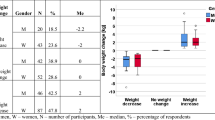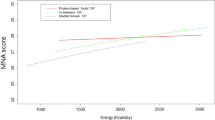Abstract
Objective: Our purpose was to identify the main barriers and benefits perceived by the European citizens in regard to following a healthy diet and to assess the differences in expected benefits and difficulties between Spain and the remaining countries of the European Union.
Design: A cross-sectional study in which quota-controlled, nationally representative samples of approximately 1000 adults from each country completed a questionnaire.
Setting: The survey was carried out between October 1995 and February 1996 in the 15 member states of the European Union.
Subjects: Participants (aged 15 y and older) were selected and interviewed in their homes about their attitudes towards healthy diets. They were asked to select two options from a list of 22 potential barriers to achieve a healthy diet and the benefits derived from a healthy diet. The associations of the perceived benefits of barriers with the sociodemographic variables within Spain and the rest of the European Union were compared with the Pearson chi-squared test and the chi-squared linear trend test. Two multivariate logistic regression models were also fitted to assess the characteristics independently related to the selection of ‘Resistance to change’ among the main barriers and to the selection of ‘Prevent disease/stay healthy’ as the main perceived benefits.
Results: The barrier most frequently mentioned in Spain was ‘Irregular work hours’ (29.7%) in contrast with the rest of the European Union where ‘Giving up foods that I like’ was the barrier most often chosen (26.2%). In the multivariate logistic regression model studying resistance to change, Spaniards were less resistant to change than the rest of the European Union. The benefit more frequently mentioned across Europe was ‘Prevent disease/stay healthy’. In the multivariate logistic regression model women, older individuals, and people with a higher educational level were more likely to choose this benefit.
Conclusions: It is apparent that there are many barriers to achieve healthy eating, mostly lack of time. For this reason a higher availability of food in line with the nutrition guidelines could be helpful. The population could have a better knowledge of the benefits derived from a healthy diet.
Sponsorship: Institute of European Food Studies (IEFS), Dublin; DG-V European Union.
European Journal of Clinical Nutrition (2000) 54, 453–459
This is a preview of subscription content, access via your institution
Access options
Subscribe to this journal
Receive 12 print issues and online access
$259.00 per year
only $21.58 per issue
Buy this article
- Purchase on Springer Link
- Instant access to full article PDF
Prices may be subject to local taxes which are calculated during checkout
Similar content being viewed by others
Author information
Authors and Affiliations
Corresponding author
Rights and permissions
About this article
Cite this article
Holgado, B., de Irala-Estévez, J., Martínez-González, M. et al. Barriers and benefits of a healthy diet in Spain: comparison with other European member states. Eur J Clin Nutr 54, 453–459 (2000). https://doi.org/10.1038/sj.ejcn.1600996
Received:
Revised:
Accepted:
Published:
Issue Date:
DOI: https://doi.org/10.1038/sj.ejcn.1600996
Keywords
This article is cited by
-
Public views of the benefits and barriers to the consumption of a plant-based diet
European Journal of Clinical Nutrition (2006)
-
The nutrition transition in Spain: a European Mediterranean country
European Journal of Clinical Nutrition (2002)



